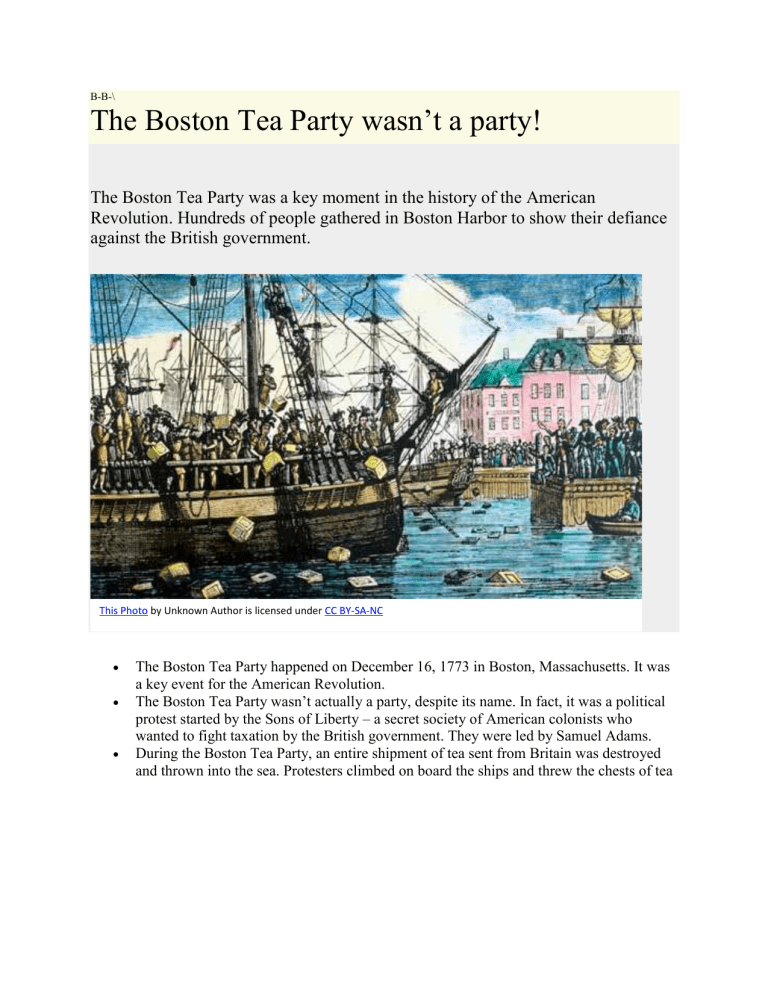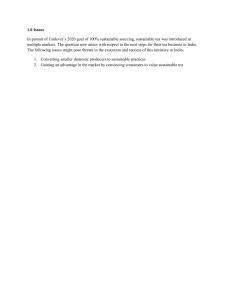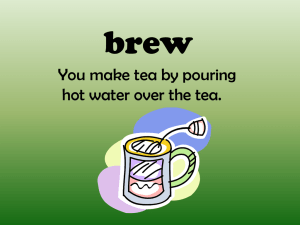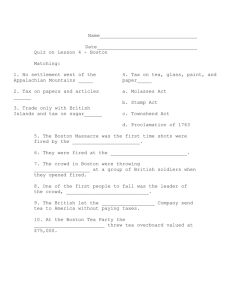
B-B-\ The Boston Tea Party wasn’t a party! The Boston Tea Party was a key moment in the history of the American Revolution. Hundreds of people gathered in Boston Harbor to show their defiance against the British government. This Photo by Unknown Author is licensed under CC BY-SA-NC The Boston Tea Party happened on December 16, 1773 in Boston, Massachusetts. It was a key event for the American Revolution. The Boston Tea Party wasn’t actually a party, despite its name. In fact, it was a political protest started by the Sons of Liberty – a secret society of American colonists who wanted to fight taxation by the British government. They were led by Samuel Adams. During the Boston Tea Party, an entire shipment of tea sent from Britain was destroyed and thrown into the sea. Protesters climbed on board the ships and threw the chests of tea straight into Boston Harbor. The tea was ruined and could not be used. This Photo by Unknown Author is licensed under CC BY 340 chests of tea were destroyed in the Boston Tea Party. The protest happened because the Sons of Liberty were not happy that the British government was making them pay tax on the shipments of tea that were brought into America. The tea had a tax added to it because of Britain’s Tea Act of 1773. The aim of the Tea Act was to reduce the amount of surplus tea that the East India Trading Company had stored in its London warehouses, but a tax was added when it was sent to the American colonies to help raise extra money. The American colonies (including the Sons of Liberty) had not agreed to pay this tax and thought that it was unfair. To disguise themselves, the Sons of Liberty painted their faces and dressed as warriors and Native Americans. As a result of the protest, the British government closed the Port of Boston to all ships. The Royal Navy sent warships to patrol the area and make sure no one went in or out. Closing the Port of Boston made the residents very angry as they thought that everyone was being punished when it was only one group of people, the Sons of Liberty, who had destroyed the tea. The Boston Tea Party was simply called ‘the destruction of the tea’ for many years after the event. The Boston Tea Party was one of the main triggers for the American Revolution, which began in Massachusetts on April 19, 1775, just outside Boston. Kidzconnect.com Coffee popularity has roots back to the Revolutionary War No matter where you go in the US, you see coffee. It's in every restaurant, grocery store, gas station, airport, office building, meeting and almost every American home. But, have you ever wondered why you see coffee everywhere and not tea? The US used to be a British Colony. And then there was a giant tea party where colonists (see above) threw crates of tea overboard to protest taxes. John Adams declared tea a "traitor's drink" In a letter from John Adams (colonist politician) to his wife, he stated, "Tea must be universally renounced and I must be weaned, and the sooner the better." From this point on there was an unofficial boycott on tea in the (then) British Colonies. People united and vowed to only serve coffee in their homes. Soon this show of solidarity spread throughout the Colonies and people began to associate coffee with the Revolution. It even got to the point where people viewed drinking tea as a betrayal to the Colonies. Why it was such a popular movement Back in the late 1700s, tea was quintessentially British. The King and Queen drank it, all the royalty drank it and the entire population was fanatical about tea. On the business side, the East India Company (which was British) ruled the tea trade and the British were in the process of setting up their own tea farms in Sri Lanka (formerly Ceylon) and India. Tea was so closely associated with Britain that to boycott tea was to boycott British culture. Tea was eventually phased out The Boston Tea Party occurred in 1773. The end of the Revolutionary War was in 1783. This means that the Colonists (and soon to be Americans) had boycotted tea for roughly John Adams 10 years. It was over these 10 years that people developed a taste for coffee and once people started to drink coffee every day, there was no going back. The same thing happened with French wine Back in 2003, there was a lot of anti-French sentiment occurring throughout the US due to politics in our Post 9/11 world. Because of this, many restaurants refused to serve French wines, opting instead for American, Australian and South American wines. Even though the anti-French sentiment died down, wines from France are much more difficult to find these days compared to 10 years ago. Summary It is amazing how a political movement from over 200 years ago helped shape something as simple as coffee and tea. If John Adams and others had not started the movement to ban tea, America would most likely be a tea-drinking nation.



